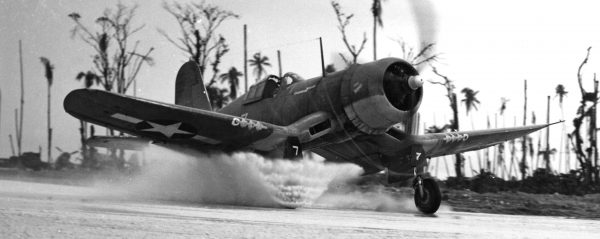World War II Chronicle: June 15, 1943
Click here for TODAY’S NEWSPAPER
Pictured on the front page is British prime minister Winston Churchill as he checks results of bombing raids with Maj. Gen. Jimmy Doolittle in North Africa… Maj. Gen. William C. Lee, commanding general of the 101st Airborne Division and the “Father of the U.S. Army Airborne,” has been injured in training again, this time due to a glider crash. Last week was Lee’s first jump since injuring his back in a jump last year… George Fielding Eliot thinks that the U.S. is likely to use airborne infantry in taking Sicily (see page 10)…
A “properlerless” Italian plane is pictured on page five (better detail here). The Italians did produce the Caproni Campini, which is currently undergoing testing, but their jet never became operational. I’m no expert on Axis fuselages, but it’s entirely possible that with stories likely floating around about mysterious aircraft that don’t use props, a photo is bound to turn up, even if it’s just a fighter without its propeller installed…
Down on The Farm
You may know that the the CIA compound where they train future spies is called “The Farm.” But before there was a CIA, the Navy Seabees trained at Camp Peary, Virginia and kept a pig farm on base, which they used to feed the sailors. Capt. John Ware defending against critics saying his command is profiting from the pigs on page six. The CIA takes over the camp, which becomes known as The Farm, after the Seabees’ pig farm…
I was reading a story this morning of a World War II veteran who flew for the Blue Angels who flew his crippled fighter back to base and miraculously was able to land. He said he didn’t want to bail out of his plane because if the Japanese didn’t get you on the way down the sharks would get you once you hit the water. Here’s one such example of Japanese aerial barbarism: on page 13 Lt. Samuel S. Logan, a Marine Corsair pilot with Marine Fighting Squadron 112 (VMF-112), had his feet mangled by a Japanese propeller. It took several passes before the enemy pilot could hit the Marine. Logan is picked up shortly after hitting the water, and has his foot surgically amputated. He hopes to return to the cockpit, since British pilots have done so despite artificial legs.

Another aviator from the same engagement (which is discussed further in this post) north of the Russell Islands survived a 2,000-foot free fall into the ocean when his chute doesn’t open. Lt. James G. Percy was already wounded from the dogfight, but the impact breaks his pelvis and sprains his ankles. He manages to swim three hours to reach land. Percy now has six victories, making him an ace and he is awarded the Navy Cross. Percy flies helicopters during the Korean war and later becomes the commanding officer of Marine Experimental Helicopter Squadron 1 (HMX-1) and holds the distinction of being the first Presidential Helicopter Pilot…
Sports section begins on page 16.
Roving Reporter by Ernie Pyle
SOMEWHERE IN AFRICA — At any number of our camps in Central Africa, I noticed with sharp surprise a playful little thing which you would never be aware of if you hadn’t been at the front.
In these camps, soldiers will walk along in groups, kidding and laughing, and you’ll hear them give each other mock others of “Squads Right,” or “Halt.”
The first time I heard that shouted word “Halt” down there, I stopped dead still, and my heart skipped a couple of beats. For believe me, when you’re up at the front, halt means halt and no monkey business. Nobody ever says it in play, and when you hear it, you freeze in your tracks. If you don’t, you’re likely to get a bullet through you.
It’s a sound that bears the same deadly warning as the whine of a shell or the hiss of a snake, and you obey it automatically and instinctively.
For some reason, and I can’t explain it, the troops on Central Africa don’t go on for pets the way they do up north.
True, I’ve heard of soldiers who had baby giraffes for pets, and others who had monkeys and parrots, and even leopards. But they are rare. The small number of dogs is what amazed me. Up north, the soldiers have thousands and thousands of dogs for pets.
I guess it’s just too hot down here to walk the dog around.
Many of our officers and men, by the nature of their jobs, have covered Africa from stem to stern. They know the whole continent intimately, and they rattle off the merits of some unheard-of jungle river port as knowingly as they’d speak of Cape Town or Cairo.
And they are impressed. I’ve heard many an American say he’d sure got his eyes opened by coming over here. Before the war, he was hardly aware that Africa existed. But now he sees the immense richness of the jungle and the plains going partly to waste; he wonders who said there was no more land left in the world to pioneer.
Of course, the average soldier swears that after the war he’ll never set foot out of his hometown again. But everybody isn’t average. I’ll bet you that within five years after the war, you’ll find thousands and thousands of Americans scattered to the remotest points of the globe, carving out careers for themselves in spots they’d never heard of before 1942. This war is making us global-minded.
One evening, at a camp way down on the Slave Coast, an officer came up and introduced himself. He was Lt. Walter Wichterman, an insurance man of Indianapolis. The reason he spoke to me was this – we were college mates at Indiana University, and once went to Japan together when the Indiana baseball team made a tour over there. Our paths had not crossed for more than 20 years.
Lieutenant Wichterman has a laudable ambition. He asked me if I remembered how we used to stand on the curb in certain parts of Tokio and, after the native custom, publicly made our toilets. I did remember, indeed.
Well, Lieutenant Wichterman’s ambition is to fight his way on around the world and wind up the war by standing once again in Tokio, doing the same thing, and yelling at the assembled Japs: “Hey, look, you lice! See what I’m doing to you?”
If what I’ve seen is any indication, the average American home by now must look like the Natural History Museum. Soldiers are fiends for buying stuff and sending it home.
There isn’t so much to buy in North Africa. But in other parts, there is. The carved ivory, carved ebony, leather work, knives and stuff that have been sent home from Central Africa must reach an appalling total.
Add to that all that must be flowing home from India, China, Alaska and elsewhere, and we’re surely becoming a nation of ivory-hoarders.
Evening star. (Washington, D.C.), 15 June 1943. Chronicling America: Historic American Newspapers. Lib. of Congress.
https://chroniclingamerica.loc.gov/lccn/sn83045462/1943-06-15/ed-1/
